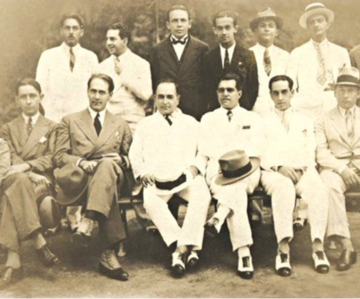Jointly organised by the Latin American History Center (CRALMI-Mondes Américains), Université Paris I Panthéon-Sorbonne, the Research Center on American Words (CERMA-Mondes Américains), École des Hautes Études en Sciences Sociales), and the Latin American History Seminar, Latin American Centre, Oxford.
Convener(s): Eduardo Posada-Carbo
Speaker(s): Ana Paula Fraga, École des Hautes Études en Sciences Sociales (EHESS)
To join online, please register in advance: https://us02web.zoom.us/meeting/register/KbVXDl5TQWCP1I0nKS1TiQ

Getúlio Vargas, dressed in white and seated at the center, among the civilian revolutionaries of 1930 after the armed conflict – CPDOC/Fundação Getúlio Vargas
Ana Paula Fraga is a Ph.D. candidate at the École des Hautes Études en Sciences Sociales (EHESS), jointly supervised by the Federal University of Rio Grande do Sul (UFRGS) and the University of Paris 8. Her research investigates state-building and centralization in Brazil, focusing on the role of provincial elites after the 1930 Revolution. Using a socio-historical approach, she examines how local actors—particularly governors—helped redefine authority under Getúlio Vargas’ administrations. She is affiliated with the Mondes Américains Laboratory at EHESS, and from 2021 to 2024 her work has been funded by the Labex Tepsis. Ana Paula is the recipient of the 2023 Francesco Kjellberg Award by IPSA.